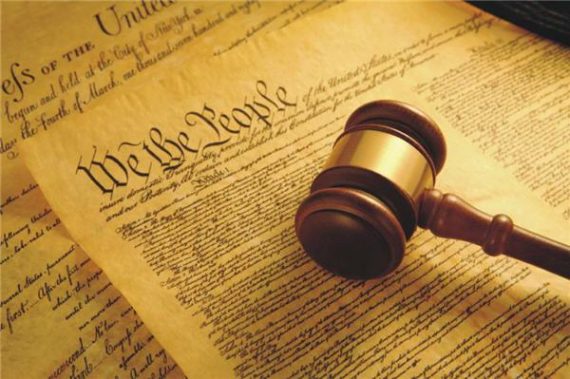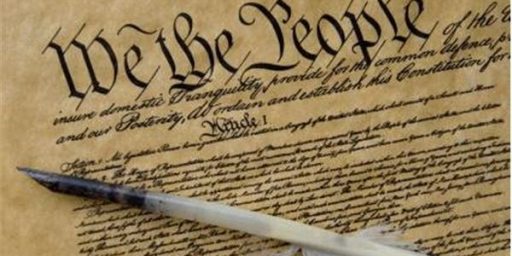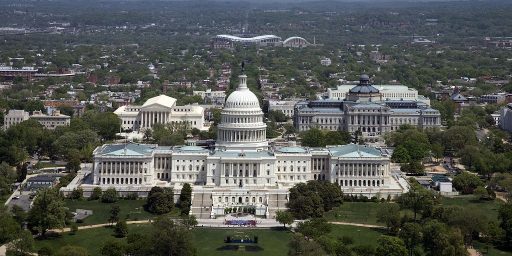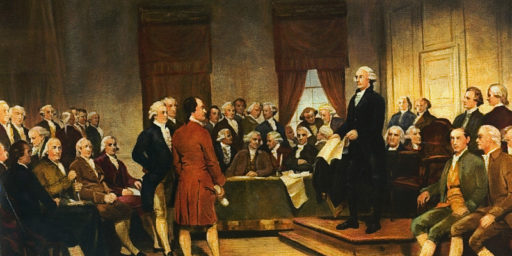Further Thoughts On The Repeal Amendment
Further thoughts on a rather radical proposed Amendment to the Constitution, prompted by a link from Instapundit.
Dana Milbank weighs in today with some thoughts about the so-called “Repeal Amendment” which I wrote about yesterday and, along with the numerous comments my post generated, Milbank’s piece raises some issues worth expanding on:
The mechanics of the amendment are also a bit odd. It would allow the repeal of any federal law – from civil rights to health care – if two-thirds of the states say so. But that could mean that the 33 smallest states, which have 33 percent of the population, have the power to overrule the 17 largest states, which have 67 percent of the population.
Then there’s the unfortunate echo of nullification — the right asserted by states to ignore federal laws they found objectionable – and the “states’ rights” argument that was used to justify slavery and segregation.
The man who thought up the amendment, Georgetown Law professor Randy Barnett, intended no such thing. “States are every bit as subject to abusing their power as the federal government,” he told me in his office Wednesday. Barnett, a Chicago native who is affiliated with the libertarian Cato Institute and wants to limit restrict government at all levels, said he would oppose the amendment himself if he thought it could be used to restore discrimination. “There was never two-thirds of states that supported slavery or supported segregation,” he reasoned. “At best it was half.”
Glenn Reynolds slaps Milbank a little for arguing against the proposed amendment on the basis that it would upset the Constitutional balance between the Federal government and the states:
The amendment process, after all, is part of the Constitution. The Framers had no illusions that they were creating perfection, and believed in the sovereignty of the people and in the power of the people to revise the Constitution as needed, through the process they created. The idea that the text of the Constitution should be revised only through judicial reinterpretation is a modern conceit, and one that does no honor to the Framers at all.
Ann Althouse agrees with Reynolds:
Since the Repeal Amendment, proposed by Randy Barnett, can easily be portrayed as an effort to return to something closer to the balance of power provided for in the original Constitution, it is pretty silly to portray yourself as brimming with respect for the Founders when what you really support is the shift of power to the national government that occurred over the long stretch of time, a shift that the courts have allowed to take place.
Professor Reynolds makes a valid point, and Professor Althouse is right that the relationship between the Federal Government and the states has changed drastically from the way it was envisioned by the Founders.
Part of that change, of course, occurred because of the passage of the 14th and 15th Amendments, which gave the Federal Government significant authority over the the states when it came to due process, equal protection of the laws, and voting rights, and the 17th Amendment, which altered the manner in which Senators were selected. All of these significantly altered the relationship between the Federal Government and the states, and those alterations were done in what is, as Instapundit himself points out, a perfectly Constitutional manner.
It’s also true, of course, that a whole series of Supreme Court decisions has also contributed to the changed relationship between the Washington and the states. Some of those are based on wildly incorrect interpretations of the Commerce Clause, others, however, are simply a natural outgrowth of the Incorporation Doctrine, which applied the provisions of the Bill of Rights to the states. Because of that doctrine, the Supreme Court has ruled that states are bound by the provisions of the Fifth, Sixth, Seventh, and Eighth Amendments in criminal matters, that they cannot engage in unreasonable searches or searches without a warrant, that they must comply with the provisions of the First Amendment, and that they cannot impose a blanket ban on the ownership of handguns. All of these restrict the power of the states, but they do so in a manner which actually increases and helps to protect individual liberty.
Finally, the Civil War itself was the beginning in a change in the way Americans thought of their country. Where it used to be the case that people thought of themselves primarily as residents of their state, Americans today tend to think of themselves as Americans first. On top of all that, a long history of movement from place to place that people don’t necessarily think of the state where they live as “home” any more. For better or worse, going back to the Founders “original intent” on this issue is impossible simply because so much has changed over the past 223 years.
Which brings us to the Repeal Amendment, the related concept of “nullification,” and the entire idea of “state’s rights.”
Part of my concern about the Repeal Amendment is that American history is replete with evidence that states can be as great a threat to liberty as the Federal Government, perhaps even more so considering that they have the ability to have so much more authority over the daily lives of citizens. More often than not, the assertion of states’s rights has been in support of causes that actually harm individual liberty.
That history begins with the Nullification Crisis of 1832, when South Carolina purported to declare a Federal import tariff unconstitutional and took steps to prevent Federal agents from collecting tariffs on goods entering through the Port of Charleston. Though the matter was resolved, it set the nation down a road toward secession that resulted in the bloodiest war in American history. After the Supreme Court’s decision in Brown v. Board of Education, ten Southern states used the doctrine of nullification, and the related concept of interposition, to attempt to resist efforts desegregate school and refuse to enforce the Court’s decision. In Cooper v. Aaron, the Supreme Court held that such efforts were unconstitutional:
Article VI of the Constitution makes the Constitution the “supreme Law of the Land.” In 1803, Chief Justice Marshall, speaking for a unanimous Court, referring to the Constitution as “the fundamental and paramount law of the nation,” declared in the notable case of Marbury v. Madison, 1 Cranch 137, 177, that “It is emphatically the province and duty of the judicial department to say what the law is.” This decision declared the basic principle that the federal judiciary is supreme in the exposition of the law of the Constitution, and that principle has ever since been respected by this Court and the Country as a permanent and indispensable feature of our constitutional system. It follows that the interpretation of the Fourteenth Amendment enunciated by this Court in the Brown case is the supreme law of the land, and Art. VI of the Constitution makes it of binding effect on the States “any Thing in the Constitution or Laws of any State to the Contrary notwithstanding.” Every state legislator and executive and judicial officer is solemnly committed by oath taken pursuant to Art. VI, cl. 3, “to support this Constitution.” Chief Justice Taney, speaking for a unanimous Court in 1859, said that this requirement reflected the framers’ “anxiety to preserve it [the Constitution] in full force, in all its powers, and to guard against resistance to or evasion of its authority, on the part of a State . . . .” Ableman v. Booth, 21 How. 506, 524.
No state legislator or executive or judicial officer can war against the Constitution without violating his undertaking to support it. Chief Justice Marshall spoke for a unanimous Court in saying that: “If the legislatures of the several states may, at will, annul the judgments of the courts of the United States, and destroy the rights acquired under those judgments, the constitution itself becomes a solemn mockery . . . .” United States v. Peters, 5 Cranch 115, 136. A Governor who asserts a [358 U.S. 1, 19] power to nullify a federal court order is similarly restrained. If he had such power, said Chief Justice Hughes, in 1932, also for a unanimous Court, “it is manifest that the fiat of a state Governor, and not the Constitution of the United States, would be the supreme law of the land; that the restrictions of the Federal Constitution upon the exercise of state power would be but impotent phrases . . . .” Sterling v. Constantin, 287 U.S. 378, 397 -398.
In other words, if nullification of the type that the Repeal Amendment contemplates actually existed, we would no longer live in a Federal system, but in something more closely resembling the Articles of Confederation. Since the Constitution was written to replace the Articles, it’s clear that the Founders never intended to give the states the power to decide for themselves what the Constitution means and to randomly choose to ignore Federal laws based on that interpretation. Amending the Constitution to give that power legitimacy as the Repeal Amendment suggests strikes me as a both a bad, and an outdated, idea.







I don’t understand how repeal of a federal law could infringe upon liberty. In almost all cases laws are used to limit liberty.
These are extraordinary times and it should not surprise anyone that new ideas will emerge. Now that the idea is out there having discussions like this is exactly how it’s supposed to work. I see Doug’s point that the potential for mischief with such an amendment is there but we already have criminal mischief taking place in terms of deficits and debt.
Of course much of this debate is a result of the health care reform process and how the federal government rammed through something we still haven’t figured out. Those sorts of abuses could be threatened with nullification and Congress forced to do things right.
<em>Professor Reynolds makes a valid point, and Professor Althouse is right that the relationship between the Federal Government and the states has changed drastically from the way it was envisioned by the Founders</em>
I was going to go on a screed about The Federalist papers, the architects, and the Articles and such, but then you said:
<em>In other words, if nullification of the type that the Repeal Amendment contemplates actually existed, we would no longer live in a Federal system, but in something more closely resembling the Articles of Confederation. Since the Constitution was written to replace the Articles, it’s clear that the Founders never intended to give the states the power to decide for themselves what the Constitution means and to randomly choose to ignore Federal laws based on that interpretation.</em>
So, raving not needed. Well done.
Of course much of this debate is a result of the health care reform process and how the federal government rammed through something we still haven’t figured out. Those sorts of abuses could be threatened with nullification and Congress forced to do things right.
What haven’t you figured out yet? If you don’t understand it, I suggest you start here.
Republicans promoting political m&^sturbation.
So the two ideas so far from the GOP — this idiocy and the allegedly new budgeting process — have both been transparent tea party bait gimmicks designed like a 3 card monte dealer’s swift hand movements to distract from the real issues.
Everyone who is surprised kindly refrain from procreating.
Plunk: “I don’t understand how repeal of a federal law could infringe upon liberty. In almost all cases laws are used to limit liberty.”
Right. Like the Civil Rights Act was a huge limitation on liberty. If this ludicrous amendment had been passed then, it would still be essentially legal to murder African Americans in Mississippi. But as long as the Right is busy celebrating the anniversary of the greatest act of treason in American history, I don’t see why they’d have any problem with that. As long as taxes were kept low for the rich.
SP: These are not extraordinary times. I suppose having a Democratically-controlled Congress for a few years may seem like the brink of the apocalypse to some folks, but it’s preposterous. That sort of hyperbolic rhetoric is an example of what I was talking about in a comment to floyd recently.
I’d be interested in watching the experiment.
If the amendment required 80% of the states to vote against the law–40 states–that would represent convincing a lot of people and legislatures, not just walking out onto the state capitol steps and throwing out a vaguely unpopular law. I might put a time limit in the amendment, though. Maybe it should require something like “no more than three years after the initial passage of the subject law”.
My main thought on this is the same as when I hear that congress wants to look into something unimportant like the BCS or Major League Baseball where it’s obviously not going to do anything. This doesn’t matter. Nor will any damage be done (compared to the things that they *could* be doing with their time).
First, this doesn’t matter because it won’t happen.
Second, even if it did happen, it wouldn’t have very much of an effect at all. It is extremely, extremely difficult to get 33 of the states to agree on much of anything.While it’s theoretically possible that 33 states with a third of the population could nullify a law, those 33 states include a rather diverse bunch. I have difficulty imagining a single law that 33 states could nullify and yet does not muster up the support for congressional action.
Even if passed, this will in no way revert us back to any sort of Articles of Confederation. It lacks the teeth. This is a waste of time.
In addition to the likelihood that this would never (or almost never) actually be used, my other thought is that if congress passed a law that you can’t even get 18 of the 50 state legislatures to support or simply defer (and not vote on it), I am not really outraged to see the law nullified.
This is not to say that I support the amendment – I would probably vote against it – but I just can’t muster up anything more than “Okay, well, if that’s what you want to spend your time on…”
“For better or worse, going back to the Founders “original intent” on this issue is impossible simply because so much has changed over the past 223 years.”
In short…the reason I’m not an originalist and also the reason why I tend to squint when I hear originalist arguments. I guess I just don’t think crafting a more perfect 18th century government is going to be all that useful in the 21st.
“In almost all cases laws are used to limit liberty.”
That may be true, considering that laws against theft limit your freedom to steal from other people, to use just one example. But I’m okay with that. Oftentimes laws that seem to constrain freedom end up unleashing it in ways we never thought imaginable.
Wow. That is an absolutely stunning statement. An insight into the libertarian mind, I guess. I have never felt that fundamentalist libertarianism could survive more than five minutes of serious though, and this is a good example why.
Lets start here with a world of no laws at all. The libertarian logic on display here would seem to argue that that would be a world of infinite liberty, or nearly so (“almost all cases”). But ” no laws” is obviously a highly unstable state. Within five minutes, the powerful in any group would impose “laws” that force everyone else to do as he wants them to do. Is there a more obvious lesson to be drawn from human history?
One could argue that all of the history of human civilization, certainly the political history of the Anglo-Saxon tradition since Magna Carta, has been to restrain the absolute power of kings, churches, or private actors who wield power of others. That is, in a sense, the whole purpose of the law. Yes, it restrains liberty – but the liberty of the few when they exercise it so as to affect the livers of others. And the restraint is done to maximize the liberty of the rest of society.
We inhibit the liberty of those who would commit murder – it ends up being a very large net positive for liberty, since it enhances the liberty of all potential victims. Same with laws against assault, bullying, thievery, fraud. Same with legal regulations about, for example, sloppy food handling – we inhibit the liberty of the processor who wants to cut some corners, or just be lazy, but we vastly enhance the liberty of everyone else who can live a modern life (buying food in a grocery store) without fear of dying from their dinner.
Slavery, Jim Crow, subjugation of women and gays, as well as the regulations mentioned above – I have seen in my own lifetime (except for the slavery) major political movements seeking to prevent government action in these areas. One can only imagine that the point of this amendment is to make it harder for us to “free the people” from these types of abuse of power.
So yeah. Repeal of federal laws will increase freedom. For those whose behavior restricts the freedom of others. In almost all cases laws are used to increase liberty for most people, by restricting it for the few who abuse it.
> In almost all cases laws are used to limit liberty.
Yup. Think about all those darned environmental laws that limit the liberty of corporations to dump poison into the environment. Freedom hating government bastards!
And the fvcked up laws that limited the ability of auto makers to sell cars with no seat belts. Tyrants, I say.
And to top it all off, McDonalds has lost the freedom to sell you hamburgers that come from cows who are too sick to walk into the slaughterhouse under their own power.
If these things don’t prove that second amendment remedies might be necessary to restore liberty, I really don’t know what will.
I suggest that Plunk read “Coventry” by Robert A. Heinline, who is something of a right wing icon anyway…
One thing that seems clear is that the GOP is having massive hubris issues, even before the new Congress is in session. Clearly these cats learned nothing from the mistakes they made last time around. The good news is that this will end up pretty much ensuring an Obama win in 2010.
Perhaps the Democrats will wise up and bring Howard Dean, who often seems to be the only Dem with a working set of nads, back into the fold, where he can administer another well deserved bitch slapping to the Republicans.
> The smaller the mind the greater the conceit. – Aesop
Funny how Aesop knew about bitEric way back then…
“Yes, it restrains liberty – but the liberty of the few when they exercise it so as to affect the livers of others.”
YESSSSSSSSSSSS!!!!!!!!!!!!!!! Freedom for the livers of others!!!!!!!!!!!!!!!!!!!”
Sorry Tano, I could not resist.